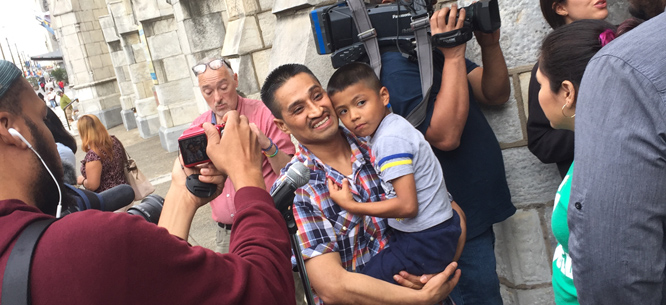Out From Sanctuary
Out From Sanctuary
Eleven months ago, Javier Flores gathered a few belongings and moved into a Philadelphia church basement to take sanctuary from a looming deportation order. Today, he is free.

Eleven months ago, Javier Flores gathered a few belongings and brought them to a makeshift bedroom in the basement of Arch Street Methodist Church, in downtown Philadelphia, to take sanctuary from a looming deportation order. He had already spent years wrestling with immigration authorities, all while running a business and raising a family with his partner Alma, before taking that final, desperate measure to stay in the country last November—a story I told in Dissent’s Summer issue.
On Wednesday, Javier—joined by Alma, their three children, and a cluster of friends, supporters, and journalists—stepped outside of Arch Street under an overcast sky and delivered a few words of thanks. After a years-long legal saga, an immigration judge had deemed him eligible for a U Visa, which means that Javier will be able to rejoin his family at their home in northeast Philadelphia and, eventually, become a citizen.
“It’s like being born again,” Javier told the assembled crowd in Spanish. “It was very hard to see all the people who come in here with their families, with their children, and not be able to leave with them. It was very difficult, and very hard. But we want to say to everyone in the community, and all the people who are in this process, that you have to keep fighting. Because after the storm comes the calm.”
Javier was one of a small number of undocumented immigrants who had entered sanctuary in order to avoid deportation at the dawn of the Trump presidency. (The New York Times counts thirty-four immigrants who have publicly taken shelter in this way since Trump took office.) I turned to him, and to the dedicated group of activists who organized his sanctuary, to better understand the possibilities and limitations facing the undocumented community in such an extraordinary time.
As we all know, Trump’s candidacy was defined and buoyed by a nativist streak from the moment he began his campaign. His administration has since dramatically expanded the purview of immigration agents to arrest and deport; encouraged intimidation tactics and raids at courthouses, schools, and hospitals; suspended the Obama-era DACA program; arrested hundreds of people—including 107 in Philadelphia—in a raid targeting so-called sanctuary cities in retaliation for their defiance; and rewritten Bush-era rules in order to secure misdemeanor convictions for first-time undocumented entrants—a cynical ploy for ratings, as Francisco Cantú writes in Harper’s, considering that border crossings are now at a historic low.
Yet in the months I spent profiling Javier, I never once saw him, his family, or the activists who pushed Philadelphia to proudly defend its undocumented community evince the kind of despair that has become all too common these days. Which is not to say that they weren’t deeply worried about Javier’s fate—not to mention the broader community’s—but rather that they continued their fight no matter the news of the day: organizing petitions and marches (including a caravan to St. Albans, Vermont, where Javier’s legal appeal was being processed), delivering speeches and organizing know-your-rights workshops in church and school basements around the neighborhood, raising money for last-minute DACA renewals, tracking down family members who had been detained by immigration police, and helping feed, clothe, educate, and shelter their neighbors.
After Javier thanked his supporters and took questions from the press, the small crowd walked a few hundred feet down the sidewalk to the local ICE office, where Javier would have the ankle-monitor he had been wearing for over a year removed. I asked Alma—who I know from first-hand experience is a phenomenal cook—if they had dinner plans yet. She laughed. “I hope he takes me out.”
Lucas Iberico Lozada lives in Philadelphia. His reporting and criticism has recently appeared in Dissent, Public Books, the Washington Post, and Paste magazine.






